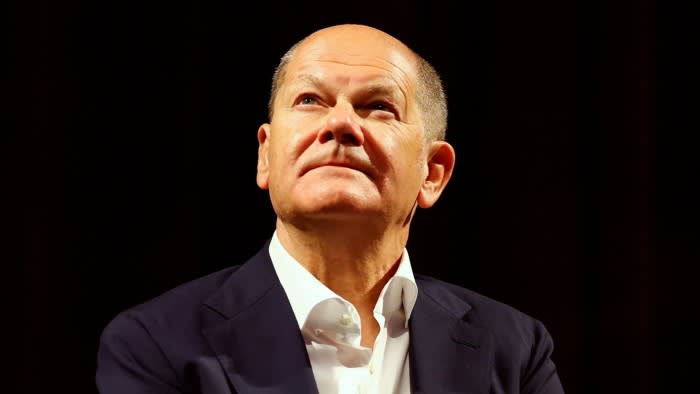Stay informed with free updates
Simply sign up to the German politics myFT Digest — delivered directly to your inbox.
The writer is an FT contributing editor and writes the Chartbook newsletter
Our Europe is mortal. It can die. So said President Emmanuel Macron of France in a recent speech at Sorbonne University. Given the trouble on Europe’s horizon, you can see his point.
The war in Ukraine has swung in favour of Russia. Europe’s economy limps behind the US. The immigration question looms on the southern border. The far right is surging. To avoid falling off a cliff in 2026, Europe’s much-hailed Green Deal needs refunding.
If Donald Trump wins in November, he may pull the US out of the Paris climate accords and put the future of Nato in question.
Of course, recognising your mortality is not the same as facing an immediate death sentence. But, by the end of 2024, it is easy to conjure truly dark scenarios. In this light, you might expect that Europe’s capitals, led by Paris and Berlin, would be scrambling for a grand bargain on common defence, investment and green spending.
Instead, what emerged from three days of Franco-German summitry this week was a limp joint statement. The two countries’ leaders evoked sovereignty but delivered none of its substance. Their main buzzwords — competitiveness and capital markets union — are the well-worn boilerplate of EU communiqués. The emphasis on competitiveness is a reflex of the daunting geoeconomic environment. Promising capital markets union sidesteps the question of common EU borrowing.
Paris is not to blame for this impasse. As he struggles to avoid the label of lame duck, Macron has been spurred, once again, into bold thinking. He has called for a doubling of the EU budget and a big investment push. He has a strong ally in Spain. In the European Council, which groups EU national leaders, there are calls for defence spending to be funded by common borrowing.
Despite the risks on the horizon, none of this finds any echo in Berlin. Nothing new there. Germany has long been a drag on Macron’s European ambitions. But it is finding new ways to disappoint.
In the past, Germany dragged its feet in Europe because it felt strong and thought that time was on its side. This was always wrong-headed. Germany too paid a price for the disastrous mishandling of the Eurozone crisis. Today, complacency is even more out of place.
Unlike France, Germany is militarily defenceless and painfully dependent on the US. If Trump is elected for a second term, no one will receive a less warm welcome in Washington than Olaf Scholz. Germany’s energy policy is in disarray. Germany’s fabled manufacturing sector faces an uncertain future. The far-right Alternative for Germany, which until recently has surged in the polls, is so disagreeable that Europe’s other rightists shun it.
If Germany’s government is stalling in the face of all this, it is not a sign of complacency, but of paralysis.
In August 2022, as Ukraine was poised to launch its dashing counteroffensive, Scholz laid out in Prague a bold vision of EU eastward expansion. Fast forward to 2024: as Ukraine struggles to hold the line, that prospect is receding into the distance. At home, the reform promise of Scholz’s government has not aged well. His Social Democrats secured victory in 2021 with the promise of a “normal life” for their ageing electorate. But as has become clear, for things to stay the same much must change. This is where Scholz falls down.
At first, he left it to the Greens to dynamise his coalition. But a savage backlash on the energy transition and agriculture has turned the environmentalists into scapegoats of the nation. And the hostile fire has come not just from the tabloid Bild-Zeitung but, within Scholz’s coalition, from the “autobahn liberals” of the Free Democrats.
Allowing FDP leader Christian Lindner to claim the finance ministry was a high-risk gamble. At first he showed flexibility, but increasingly he has dug in his heels on debt. On Europe the minister and his team openly polemicise against further common debt issuance.
This stonewalling might be understandable if it brought in the votes. But support for the FDP has crashed. In a general election, Germany’s finance minister would likely be outscored by the upstart party of leftwing maverick Sahra Wagenknecht.
Lindner’s latest stunt is to pick a fight with the only truly popular member of the government, defence minister Boris Pistorius. Lindner wants Pistorius to cut about €6bn from Germany’s defence planning. With Berlin in this state, it is little wonder that Europe is drifting.
Optimists will say that if it comes to the worst, Europe will once again find a way through. They may be right. But crisis-fighting at the EU level depends on choices made in Berlin. In 2012 and 2020, Angela Merkel overrode the right wing of her CDU. Would Scholz risk political survival to strong-arm Lindner for Europe’s sake? It is far from certain. If it comes to an election, what is the alternative? Friedrich Merz, the CDU leader whose party tops opinion polls, prefers the role of divisive polemicist to that of constructive opposition leader.
When, amid the Eurozone crisis, Berlin was dubbed Europe’s reluctant hegemon, that implied strategic choice. Today, faced with even greater perils, what prevails in Berlin is not deliberate restraint, so much as a vacuum of European policy.
Video: Why the far right is surging in Europe | FT Film
Source link : https://www.ft.com/content/226bf4b4-3c12-4575-bd84-4305b88fcd62
Author :
Publish date : 2024-05-31 03:00:00
Copyright for syndicated content belongs to the linked Source.
